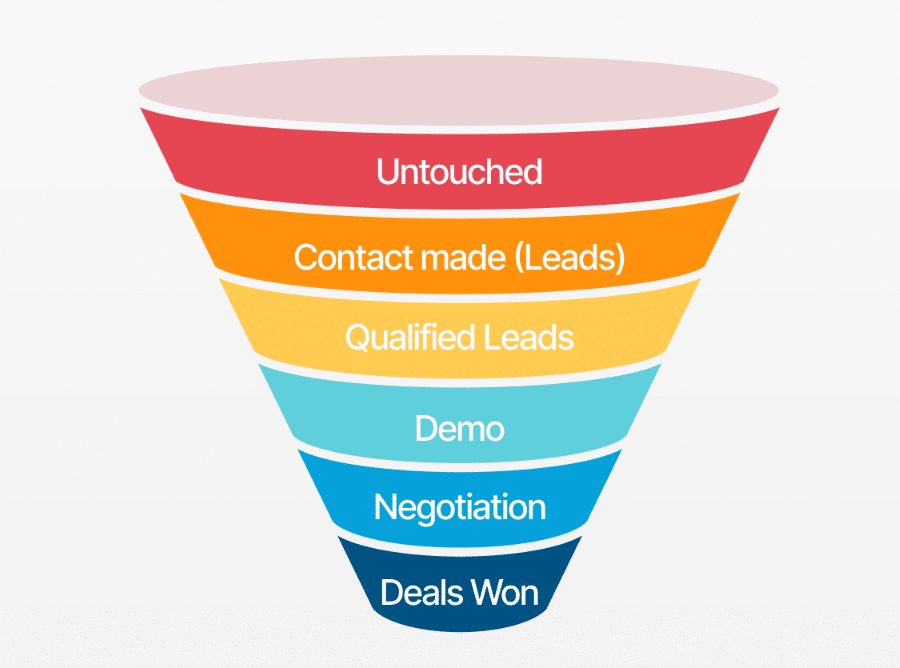In the fast-paced world of sales, understanding “What Is a Sales Pipeline” is crucial for success. This comprehensive guide will walk you through every aspect of a sales pipeline, from its definition to advanced strategies for optimizing your sales process. Whether you’re a seasoned sales professional or just starting your sales journey, this article will equip you with the knowledge and insights you need to excel in the competitive world of sales.
What Is a Sales Pipeline?

Exploring the Basics
A sales pipeline is the backbone of any successful sales operation. It represents the stages a prospect goes through before becoming a customer. At its core, it’s a visual representation of your sales process, helping you track and manage your leads efficiently.
Key Components
Understanding the key components of a sales pipeline is essential. These include:
- Prospects: Identifying potential customers who show interest in your product or service.
- Qualification: Determining if a prospect is a good fit for your offering.
- Engagement: Building a relationship with prospects through communication and nurturing.
- Proposal: Presenting a tailored solution or offer to meet the prospect’s needs.
- Closing: Successfully turning the prospect into a paying customer.
- Follow-Up: Ensuring customer satisfaction and fostering long-term relationships.
Why Is It Important?
Streamlined Sales Process
A well-structured sales pipeline streamlines your sales process, ensuring that you don’t miss any leads or opportunities. It allows you to allocate resources efficiently and focus on the most promising prospects.
Predictable Revenue
By tracking leads through the pipeline, you gain insights into your sales team’s performance and can make accurate revenue projections. This predictability is invaluable for business planning and growth.
Enhanced Customer Relationships
A sales pipeline isn’t just about closing deals; it’s also about building strong customer relationships. Effective follow-up and post-sale engagement can lead to repeat business and referrals.
Data-Driven Decision-Making
With a sales pipeline in place, you have access to data that can inform your decisions. You can identify bottlenecks in your sales process, understand customer behavior, and fine-tune your strategies.
How to Build an Effective Sales Pipeline
Identify Your Ideal Customer
Start by defining your target audience. Who are your ideal customers? What are their pain points? Understanding your audience is the first step in creating a successful pipeline.
Develop a Clear Sales Process
Create a step-by-step sales process that aligns with your customers’ journey. This process should include stages, actions, and key metrics to track progress.
Use Sales CRM Software
Invest in a Customer Relationship Management (CRM) software to manage and automate your pipeline. CRMs help you track leads, schedule follow-ups, and analyze data.
Train Your Sales Team
Your sales team is instrumental in the success of your pipeline. Provide them with regular training and equip them with the tools and resources they need to excel.
Measure and Optimize
Continuously monitor your pipeline’s performance. Identify areas for improvement and make data-driven adjustments to optimize your sales process.
FAQs (Frequently Asked Questions)
How do I start building a sales pipeline?
Begin by identifying your target audience, defining your sales process, and investing in CRM software. These steps form the foundation of an effective pipeline.
Is a sales pipeline only for large businesses?
No, sales pipelines benefit businesses of all sizes. Whether you’re a startup or an enterprise, a well-managed pipeline can boost your sales efforts.
What role does automation play in a sales pipeline?
Automation streamlines repetitive tasks, such as lead tracking and follow-ups, allowing your sales team to focus on building relationships and closing deals.
How can I ensure my pipeline adapts to changing market conditions?
Regularly review and update your sales process to stay agile and responsive to market changes. Flexibility is key to long-term success.
Are there industry-specific sales pipeline strategies?
Yes, different industries may require tailored approaches. Research and adapt your pipeline strategies to align with your industry’s unique needs.
What metrics should I track in my sales pipeline?
Key metrics include conversion rates, lead velocity, and sales cycle length. These metrics provide valuable insights into your pipeline’s performance.
Conclusion
A well-managed sales pipeline is the cornerstone of sales success. By understanding “What Is a Sales Pipeline” and implementing best practices, you can boost your sales, nurture valuable customer relationships, and achieve predictable revenue growth. Start building and optimizing your sales pipeline today to stay ahead in the competitive world of sales.